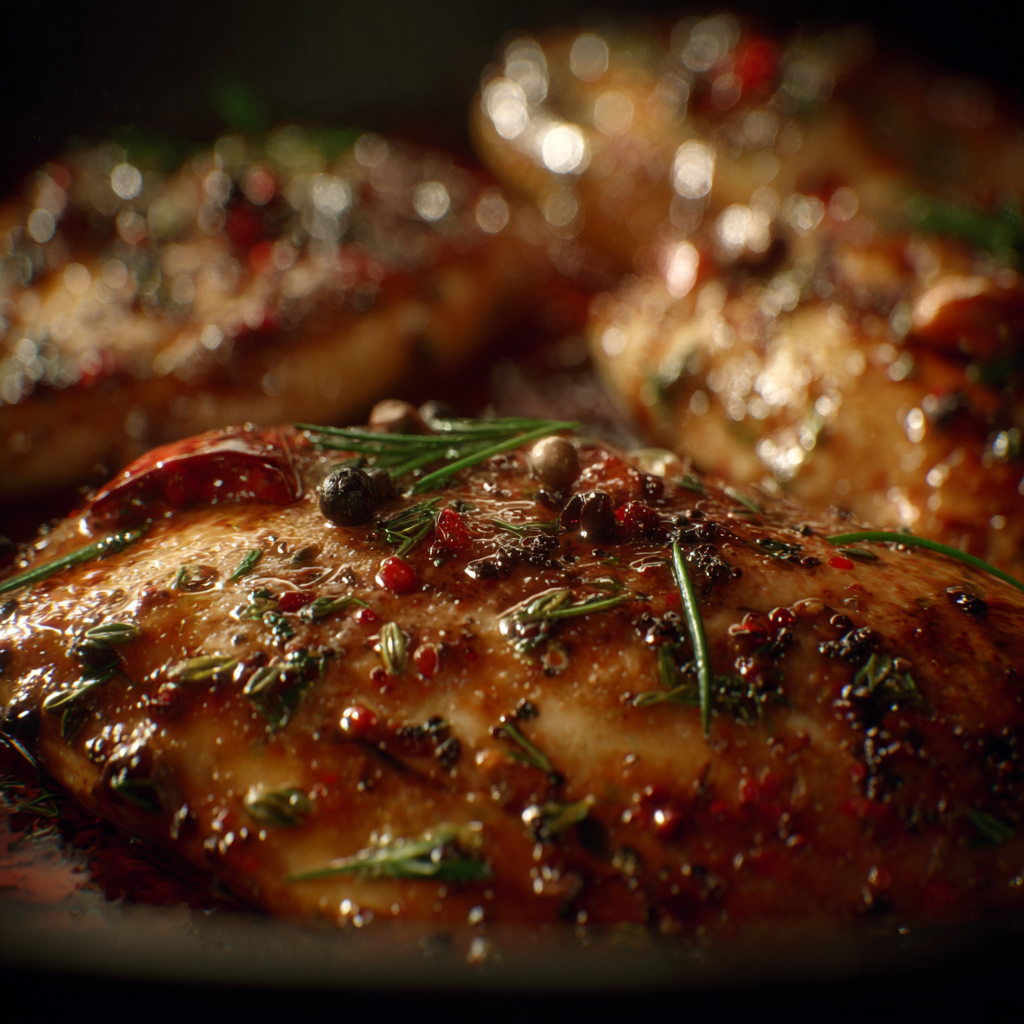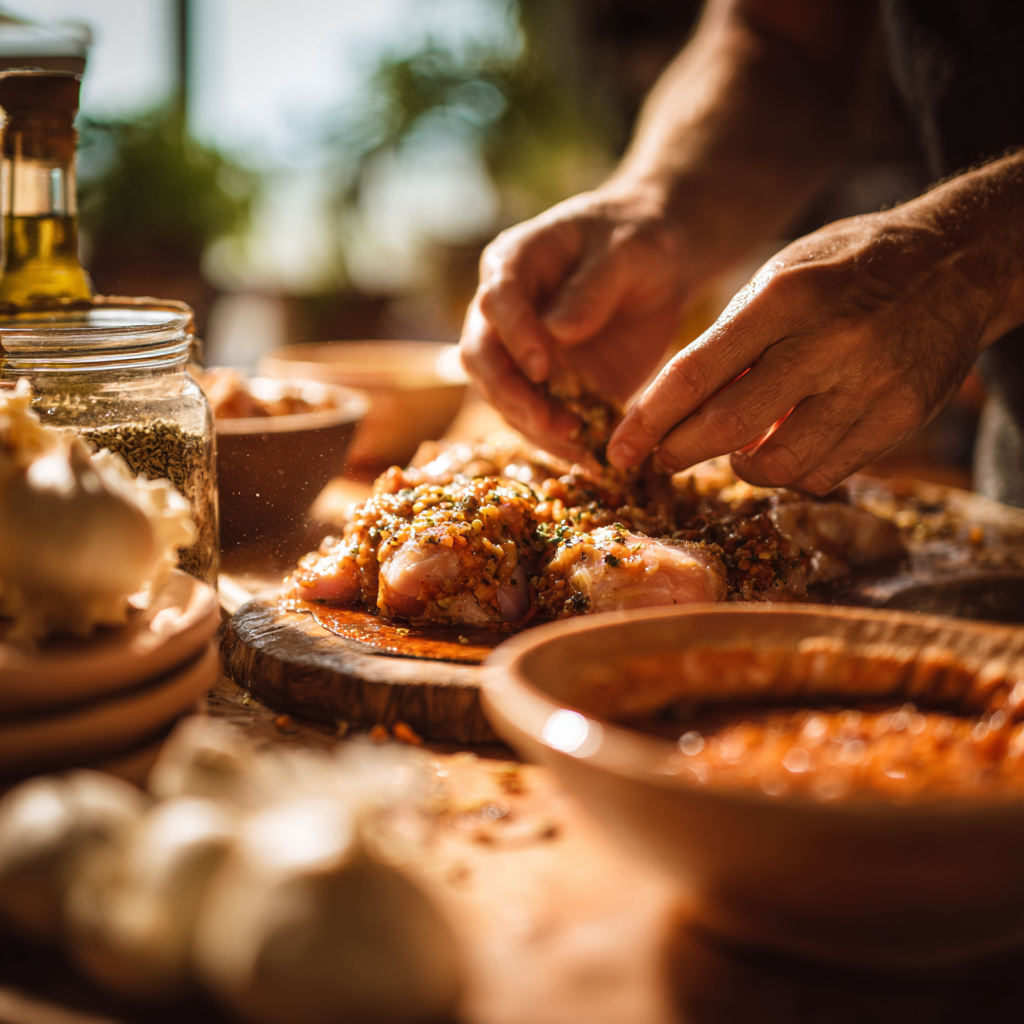
Why an Italian Marinade for Chicken is a Must-Try
I love cooking chicken. It’s versatile, healthy, and easy to prepare. But sometimes, plain chicken gets boring. That’s where Italian marinade for chicken comes in. This simple trick transforms any dish into something special.
Marinating chicken isn’t just about flavor. It also makes the meat tender and juicy. A good marinade can save even the driest cuts. Trust me—I’ve rescued many overcooked dinners this way.
What Makes Italian Marinades Stand Out?
Italian flavors are bold yet balanced. Think garlic, herbs, olive oil, and a splash of acidity like lemon or vinegar. These ingredients work together to create depth. Here’s why people love using Italian dressing marinade:
- It’s quick to prepare.
- The ingredients are pantry staples.
- It pairs well with almost anything.
I often use leftover salad dressing as a marinade. It sounds odd, but it works wonders. The oil keeps the chicken moist while the seasonings add zing.
How to Build Your Own Italian Chicken Marinade
You don’t need fancy recipes to make a great marinade. Start with four key components:
- Fat: Olive oil is my go-to choice.
- Acid: Try balsamic vinegar or fresh lemon juice.
- Seasoning: Garlic, oregano, and basil are classics.
- Sweetener: Honey adds a touch of sweetness.
Mix these elements, and you’ll have a solid base. Adjust amounts to suit your taste. For example, I like extra garlic in my spicy Italian chicken marinade.
Tailor Your Marinade to the Dish
Not all marinades are one-size-fits-all. Consider what you’re making before mixing. Here’s how I adapt mine:
- For kabobs: Add smoky paprika for grill appeal.
- For pasta: Use more herbs to match Italian cuisine.
- For baking: Include mustard for richness.
One summer, I made Italian marinade for chicken kabobs. I added a pinch of red pepper flakes for heat. My friends raved about them all evening!
Gluten-Free Options for Everyone
If you avoid gluten, no worries. Many gluten-free Italian marinade for chicken recipes exist. Swap soy sauce for tamari and check labels on dressings. Most vinegars are naturally gluten-free too.
Last year, I hosted a dinner party with gluten-free guests. I used a store-bought dressing labeled gluten-free. Everyone enjoyed the meal without issues.
Authenticity Matters: Tips for Real Italian Flavor
Ever wonder what sets apart authentic Italian grilled chicken recipes? Fresh ingredients make the difference. Dried herbs are fine, but fresh ones shine brighter.
Here’s a tip from my kitchen: Crush dried herbs between your fingers before adding them. This releases their oils and boosts flavor. Also, use real Parmesan instead of powdered cheese.
Pairing Marinades with Cooking Methods
Different methods highlight different tastes. Grilling brings out charred notes, while baking locks in moisture. Let’s break it down:
| Cooking Method | Best Marinade Style |
|---|---|
| Grilling | Balsamic-based marinades |
| Baking | Honey and herb blends |
| Pan-searing | Lemon-infused options |
For instance, I adore Italian balsamic chicken marinade on the grill. The caramelized edges are irresistible.
Simple Tweaks for Variety
Don’t stick to one style. Change things up now and then. Here are some ideas:
- Add citrus zest for brightness.
- Throw in chopped sun-dried tomatoes.
- Use white wine instead of vinegar.
Recently, I tried a lemon Italian chicken marinade. The tangy flavor paired perfectly with roasted veggies. It felt light yet satisfying.
Common Questions About Italian Marinades
People ask me questions about marinades all the time. Here’s what they want to know:
- What is a good Italian chicken marinade? Anything with olive oil, garlic, and herbs works.
- Why do people marinate chicken in Italian dressing? It’s convenient and packed with flavor.
- What is the best thing to marinate your chicken in? It depends on personal taste, but balance is key.
My advice? Experiment until you find your favorite combo.

Why Italian Marinades Make Chicken Irresistible
Let’s be honest—there’s something about an Italian marinade for chicken that just hits differently. Maybe it’s the herbs, maybe it’s the balance of tangy and savory flavors, or maybe it’s because Italians have been perfecting their craft for centuries. Whatever it is, I can’t get enough of it. I remember one summer evening when my friends and I decided to grill some kabobs. We tossed chicken chunks into a bowl with olive oil, garlic, oregano, and lemon juice, and boom—it was like magic. Those Italian marinade for chicken kabobs turned out to be the star of the night. Everyone kept asking me for the recipe, but truthfully, it was so simple I almost felt guilty taking credit.
Funny enough, I didn’t even plan that meal ahead of time. Sometimes you just throw things together and hope for the best, right? That’s the beauty of Italian-inspired marinades—they’re forgiving, versatile, and hard to mess up. Most recipes rely on pantry staples you probably already have on hand: olive oil, garlic, vinegar (or citrus juice), and dried herbs like basil, thyme, or rosemary. If you want to get fancy, toss in some balsamic vinegar for a rich sweetness that pairs perfectly with grilled chicken. Speaking of which, if you’re looking for more ways to experiment with balsamic, check out this soy sauce marinade for chicken. It’s not Italian, but trust me, it’s worth trying.
By the way, here’s the thing about Italian marinades: they’re not just for grilling. You’d be surprised how many dishes you can elevate with a good soak in these flavors. For instance, ever tried making pasta with leftover marinated chicken? The juices from an mustard chicken marinade might sound odd at first, but combined with Italian seasonings, it creates a sauce that’s creamy and packed with umami goodness. Or, if you’re feeling adventurous, bake your chicken after marinating it overnight. A baked Italian chicken marinade gives you juicy meat every time without needing to monitor the grill constantly.
What Makes a Great Italian Chicken Marinade?
So, what exactly goes into crafting the ultimate Italian chicken marinade? Well, let’s break it down. There are no strict rules here, but most great marinades follow a basic formula: acid, fat, seasoning, and sometimes sweetness. Here’s how those elements come together:
- Acid: This could be red wine vinegar, balsamic vinegar, or even fresh lemon juice. Acids help tenderize the chicken while adding brightness to the flavor profile.
- Fat: Olive oil is the go-to choice for its rich taste and ability to carry other flavors. Plus, it helps keep the chicken moist during cooking.
- Seasoning: Think Italian herbs like oregano, basil, parsley, or rosemary. Garlic is also non-negotiable in my book—it adds depth and warmth.
- Sweetness (optional): Honey or brown sugar can balance out sharp flavors, especially if you’re using balsamic vinegar.
Now, you might be wondering, “What’s the best thing to marinate your chicken in?” Honestly, it depends on your taste buds. Some people swear by store-bought Italian dressing because it’s convenient and consistent. Others prefer homemade versions since they allow for customization. Personally, I lean toward homemade—it feels more authentic, and you can control the sodium levels. If you’re curious about other marinade ideas, this lemon pepper chicken marinade offers a zesty twist that works beautifully alongside Italian flavors.
Gluten-Free Options for Italian Marinades
For anyone avoiding gluten, fear not—you don’t have to miss out on the awesomeness of an Italian marinade for chicken. Many traditional marinades are naturally gluten-free, as long as you steer clear of sneaky additives like soy sauce or certain dressings. Instead, focus on clean ingredients like olive oil, fresh herbs, and vinegars. One trick I love is swapping regular breadcrumbs (if you’re coating the chicken) with almond flour or crushed gluten-free crackers.
Here’s another tip: if you’re aiming for something spicy, add a pinch of red pepper flakes to your marinade. A spicy Italian chicken marinade is perfect for those who enjoy a little kick. Just imagine biting into tender chicken with a subtle heat lingering in the background—it’s divine. And hey, if spice isn’t your jam, you can always tone it down. Balance is key, and that’s why Italian cuisine is so beloved worldwide.
Speaking of balance, have you ever thought about pairing honey with your marinade? A chicken marinade Italian dressing and honey combo is ridiculously tasty. The sweetness of the honey complements the acidity of the vinegar, creating a harmony that’s hard to resist. It’s one of those combinations that makes you wonder why you didn’t try it sooner.
Tips for Maximizing Flavor
Okay, confession time—I used to think marinating chicken was all about dumping everything into a bag and letting it sit. But over the years, I’ve picked up a few tricks that make a huge difference. First off, don’t rush the process. Marinating chicken for at least 30 minutes is essential, but if you can leave it overnight, even better. The longer it sits, the deeper the flavors penetrate the meat.
Another game-changer? Using a meat mallet or scoring the chicken before marinating. These techniques increase surface area, allowing the marinade to work its magic more effectively. Oh, and here’s a random thought—don’t forget to reserve some marinade for basting! Just make sure it hasn’t touched raw chicken unless you boil it first. Food safety matters, folks.
If you’re still unsure where to start, consider experimenting with different bases. For example, a buttermilk marinade for chicken brings creaminess and tenderness to the table, while an Italian-inspired version leans more toward bold, herbaceous notes. Both approaches have their merits, so why not mix and match until you find your favorite?
Common Questions About Italian Chicken Marinades
Before we wrap up this section, let’s tackle some common questions people ask about Italian marinades for chicken. Why do people marinate chicken in Italian dressing, anyway? Well, aside from convenience, Italian dressing provides a balanced mix of oil, acid, and seasonings—all the essentials for a solid marinade. However, as I mentioned earlier, homemade versions often yield fresher, more vibrant results.
And what about the four ingredients in a classic chicken marinade? Typically, you’ll find acid, fat, seasoning, and sweetness. But honestly, there’s no need to stick rigidly to that formula. Sometimes less is more, and other times, throwing in extra herbs or spices takes things to the next level. The beauty of cooking is that there’s always room to play around.
Lastly, what’s a good Italian chicken marinade? My personal favorite includes olive oil, balsamic vinegar, minced garlic, dried oregano, and a splash of lemon juice. Simple yet effective. Of course, feel free to tweak it based on your preferences. After all, cooking should reflect your personality—not someone else’s recipe card.
There you have it—a deeper dive into the world of Italian-inspired chicken marinades. Whether you’re grilling kabobs, baking chicken, or tossing leftovers into pasta, these tips will help you create meals that are both satisfying and memorable.

Perfecting Your Italian Marinade for Chicken: Final Tips and Tricks
You know, I’ve made my fair share of Italian marinade for chicken, and there’s always something new to learn. Whether it’s tweaking the acidity balance or figuring out how long to let the flavors meld, perfecting this dish is like a never-ending adventure. By the way, if you’re wondering why people go gaga over marinating chicken in Italian dressing, it’s because it’s a shortcut to flavor town. But let’s dive into some actionable tips and insights that’ll take your marinade game from good to absolutely unforgettable.
First things first—don’t be afraid to experiment with spices. A classic spicy Italian chicken marinade might include red pepper flakes or a dash of cayenne, but I once threw in some smoked paprika on a whim, and wow, was it a game-changer. The smoky heat added an entirely new dimension to the dish. Funny enough, my guests thought I’d spent hours slaving away, when really, it was just a quick tweak to my usual recipe.
Another thing I’ve learned? Acid is your best friend—or your worst enemy, depending on how you use it. Vinegar, lemon juice, or even balsamic in an Italian balsamic chicken marinade can tenderize the chicken beautifully, but leave it soaking too long, and you’ll end up with mushy meat. Rule of thumb: marinate for 30 minutes to 4 hours max. Any longer, and you’re flirting with disaster.
Pairing Your Italian Marinade for Chicken with Sides
Here’s a little secret: the sides you choose can make or break your meal. Sure, the star of the show is your perfectly marinated chicken, but don’t skimp on the supporting cast. I love pairing my authentic Italian grilled chicken recipes with roasted veggies, especially zucchini or bell peppers. They soak up any leftover marinade like sponges and add a pop of color to your plate.
If you’re feeling fancy, whip up a simple pasta salad with cherry tomatoes, fresh basil, and mozzarella. Drizzle a bit of olive oil and toss it all together—it’s like a mini vacation to Italy right in your kitchen. And hey, speaking of pasta, have you ever tried using your leftover Italian chicken marinade for pasta? Toss cooked pasta in the marinade (after it’s been heated to kill any raw chicken bacteria, of course), and you’ve got yourself a quick and flavorful sauce. Trust me, it’s a hack worth trying.
Actionable Tips for Marinating Success
Let’s get down to brass tacks. Here are some bulletproof tips to ensure your Italian marinade for chicken kabobs or any other variation turns out amazing every single time:
- Balance is key. Aim for a mix of acid (vinegar, citrus), fat (olive oil), and seasoning (herbs, spices).
- Use fresh herbs whenever possible. Dried herbs work in a pinch, but fresh basil, rosemary, or thyme? Chef’s kiss.
- Don’t overcrowd the marinade. Make sure each piece of chicken is coated evenly. Ziplock bags are great for this—they save space and reduce cleanup.
- Label and date your marinades. If you’re prepping ahead, slap a sticky note on the container so you don’t forget what’s inside.
Oh, and here’s a random but useful tip: if you’re making a gluten-free Italian marinade for chicken, double-check your store-bought dressings. Some sneaky brands add gluten-based thickeners, which can ruin your carefully crafted meal plan. Homemade is always safer—and tastier, if I do say so myself.
Digging Deeper: Cultural Inspiration and Personal Stories
I’ll never forget the first time I made an Italian chicken marinade with honey. It was for a potluck, and I was nervous because, well, who brings chicken to a potluck? Turns out, everyone loved it. The sweetness of the honey balanced the tanginess of the vinegar, and the garlic added just enough bite to keep things interesting. One guest even asked for the recipe, which, honestly, felt like winning an Oscar.
That experience taught me the power of combining unexpected flavors. Take inspiration from traditional Italian cooking—simple ingredients done well. For example, a classic combo like lemon, garlic, and oregano can transform plain chicken into something magical. Or try adding a splash of white wine to your marinade for a touch of sophistication. Just saying, it works wonders.
Funny story: I once forgot to label a jar of marinade in my fridge. A week later, I opened it thinking it was salsa. Let’s just say my taste buds were *not* amused. Lesson learned: always label your food. Always.
Final Thoughts Before You Get Cooking
At the end of the day, cooking is about joy, creativity, and bringing people together. Whether you’re whipping up a baked Italian chicken marinade for Sunday dinner or grilling kabobs at a summer BBQ, remember that the best meals are the ones made with love. And hey, if you’re looking for more inspiration, check out my favorite marinade ideas over at chicken marinades. There’s something there for everyone.
So go ahead, grab those ingredients, and let your imagination run wild. You’ve got this.
Frequently Asked Questions About Italian Marinade for Chicken
- What is a good Italian chicken marinade?
A good marinade includes olive oil, vinegar or lemon juice, garlic, and Italian herbs like oregano and basil. Add a touch of honey for sweetness if desired. - Why do people marinate chicken in Italian dressing?
Italian dressing is convenient and packed with flavor. It tenderizes the chicken while infusing it with herbs and acidity. - What is the best thing to marinate your chicken in?
The best marinade depends on your taste, but a mix of acid, fat, and seasoning always works. Try balsamic vinegar, olive oil, and herbs for a foolproof option. - What are the 4 ingredients in chicken marinade?
Typically, you’ll find acid (like vinegar), fat (like olive oil), seasoning (like garlic), and sweetener (like honey). - Can I use bottled Italian dressing as a marinade?
Absolutely! Just ensure it’s high-quality and adjust seasonings to taste. You can also add extra herbs or spices for depth. - How long should I marinate chicken?
Marinate for at least 30 minutes, but no more than 4 hours. Over-marinating can make the chicken mushy. - Is Italian marinade gluten-free?
It can be, but check labels on store-bought dressings. Homemade marinades give you full control over ingredients. - What sides pair well with Italian marinated chicken?
Roasted vegetables, pasta salad, or crusty bread are excellent choices. They complement the bold flavors of the chicken. - Can I reuse leftover marinade?
Only if you boil it first to kill bacteria. Otherwise, discard it to avoid foodborne illness. - How do I make my marinade spicier?
Add red pepper flakes, cayenne, or chopped jalapeños. Start small and adjust to taste.

Italian Marinade for Chicken
Ingredients
Equipment
Method
- In a bowl, combine olive oil, balsamic vinegar (or lemon juice), minced garlic, oregano, basil, and honey if using.
- Whisk until well blended.
- Season the marinade with salt and pepper to taste.
- Place chicken in a large resealable bag or dish and pour the marinade over the top.
- Seal the bag or cover the dish and refrigerate for at least 30 minutes (up to 4 hours for best results).
- Remove chicken from the marinade and cook using your preferred method (grilling, baking, or pan-searing).
